Monsta X: K-Pop megastars live the American dream in Los Angeles
Gruelling schedules, elated fangirls, repetitive interviews and drinks on hold: Rolling Stone UK follows Monsta X on the promo trail for their second English language album The Dreaming to find out what it takes to be K-pop giants
By Hannah Ewens
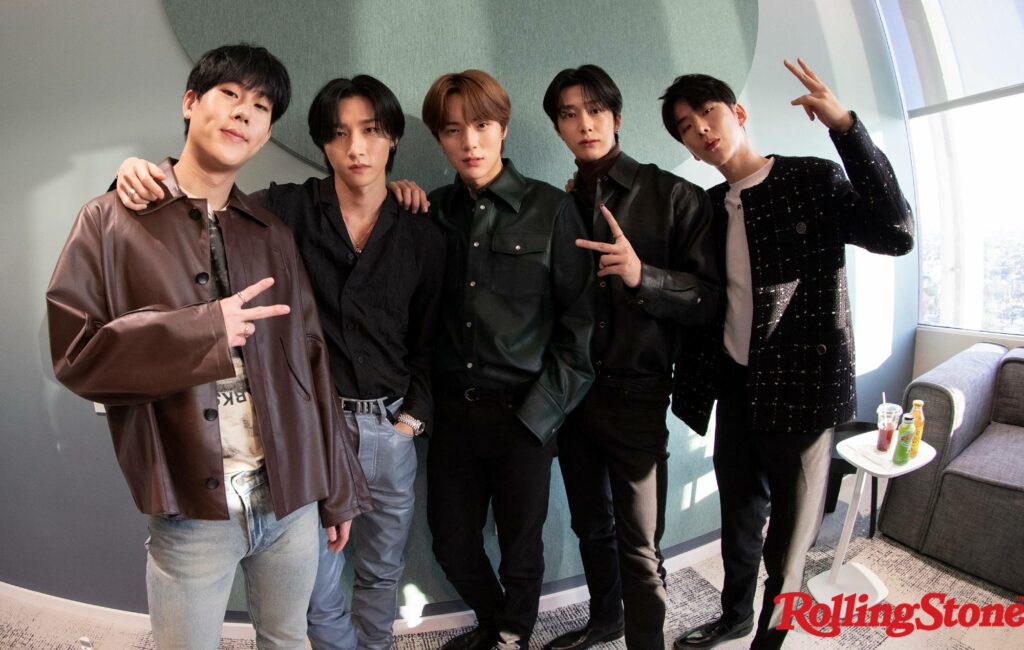
“Who is doing the interview? Oh… you. Weren’t you following us?” One of the immaculately styled young men gestures at me and their confusion sounds delicate and charming rather than rude. It’s nearing the end of my third day shadowing K-pop group Monsta X around Los Angeles on their press tour and they innocently have no idea who I am; no one had thought to introduce me. Since we were being whisked from one location to the next, the group never surrounded by fewer than eight people, often more, it had seemed unnecessary to disturb the military precision of the timetable by introducing myself, either. Brooding band member I.M. steps forward to shake my hand. “I thought we were working together,” he says, apologetically. Perhaps he had assumed I was an employee of BMG, the group’s label, or a press assistant helping to facilitate their regimented publicity schedule.

Monsta X pose for Rolling Stone UK (Picture: Jesse DeFlorio) 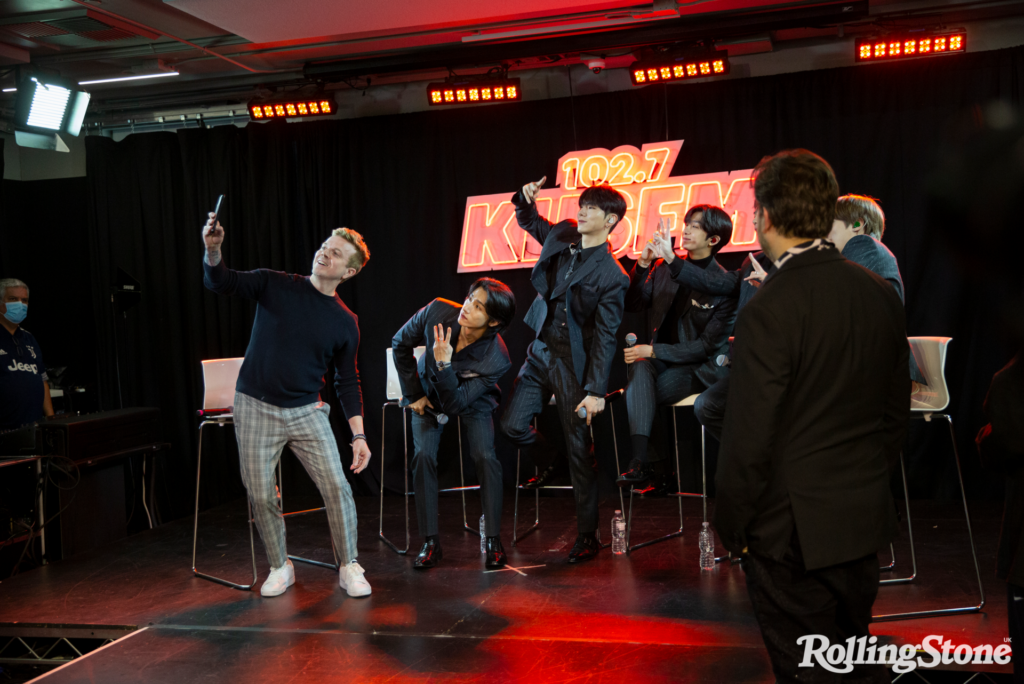
Monsta X on promo duties in LA (Picture: Jesse DeFlorio) 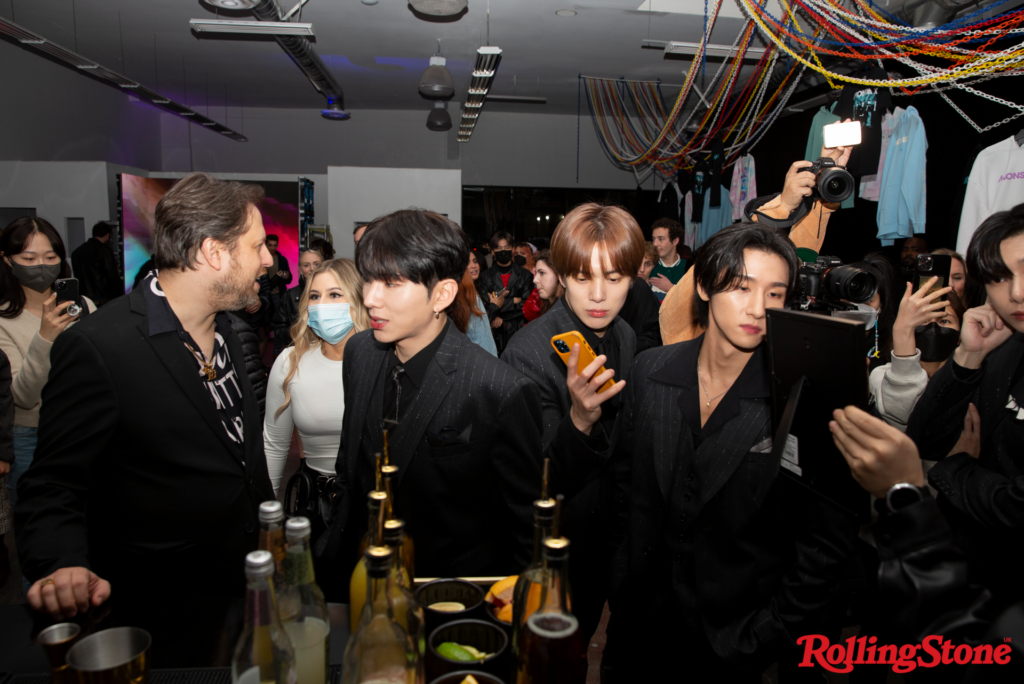
Monsta X enjoy LA’s nightlife (Picture: Jesse DeFlorio) 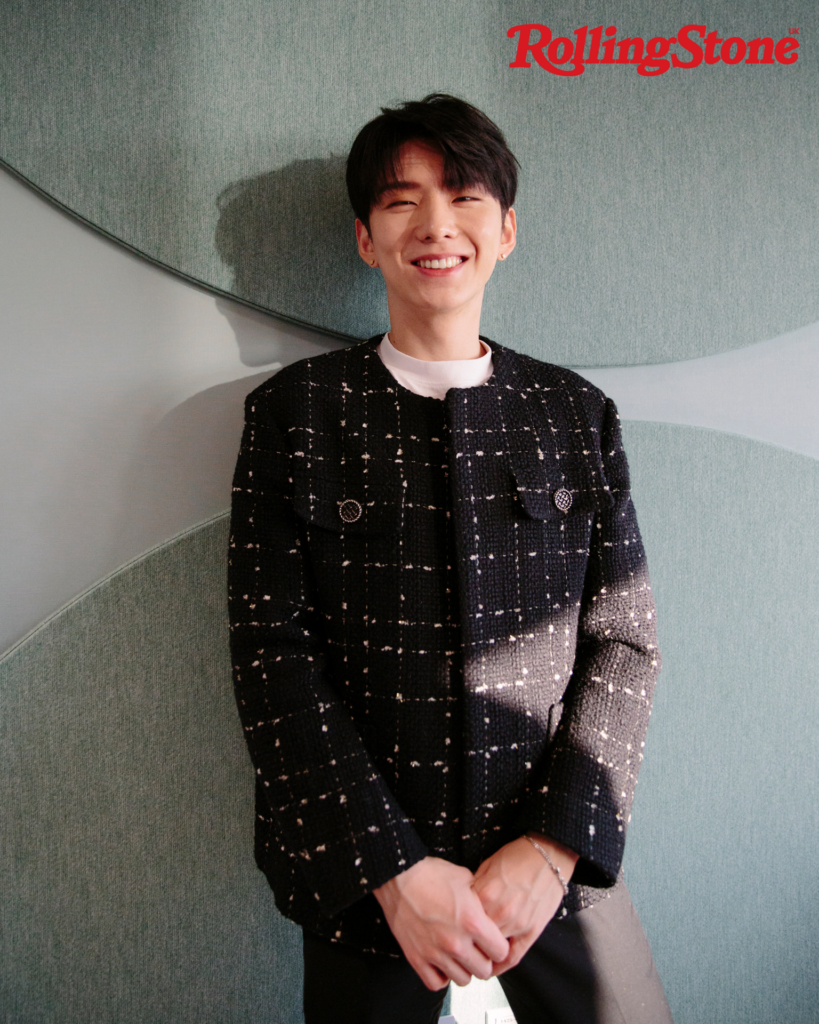
Monsta X pose for Rolling Stone UK (Picture: Jesse DeFlorio) 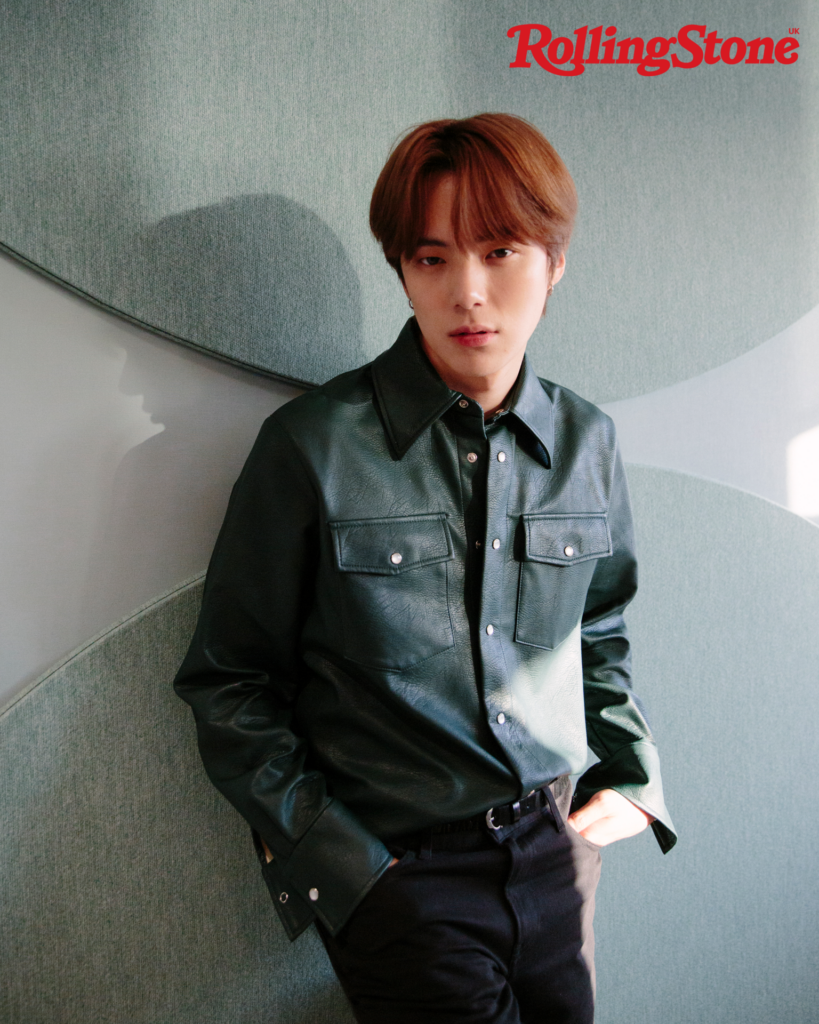
Monsta X pose for Rolling Stone UK (Picture: Jesse DeFlorio) 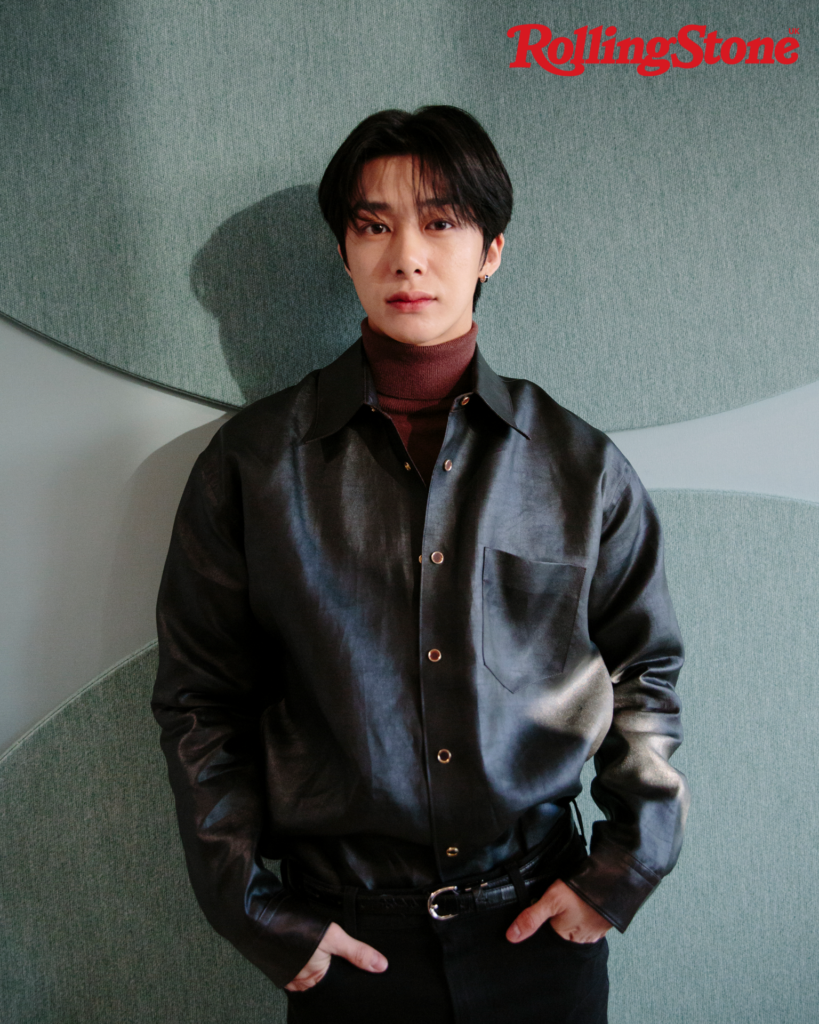
Monsta X pose for Rolling Stone UK (Picture: Jesse DeFlorio) 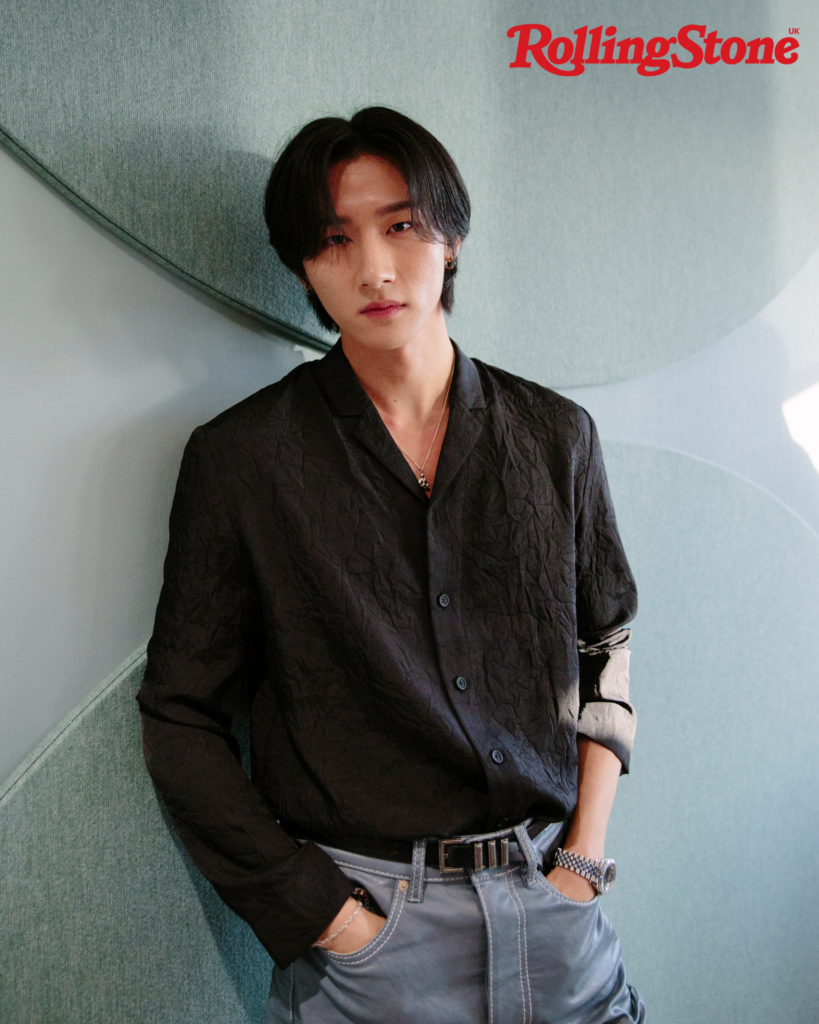
Monsta X pose for Rolling Stone UK (Picture: Jesse DeFlorio) 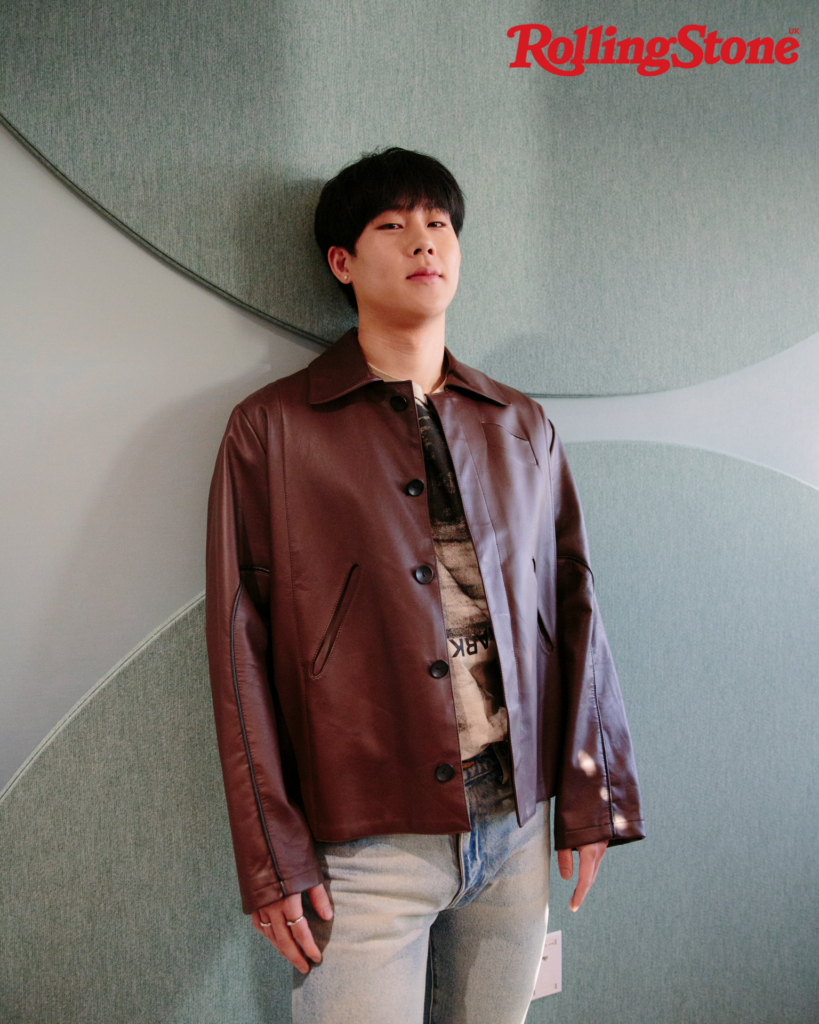
Monsta X pose for Rolling Stone UK (Picture: Jesse DeFlorio) 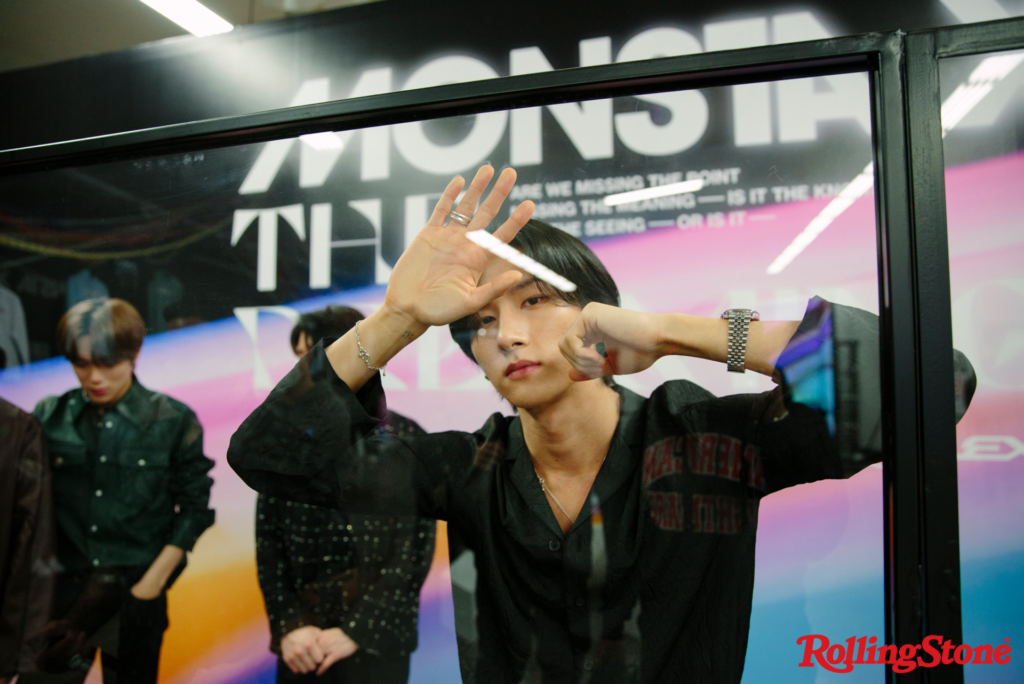
Monsta X meet their fans in Los Angeles (Picture: Jesse DeFlorio) 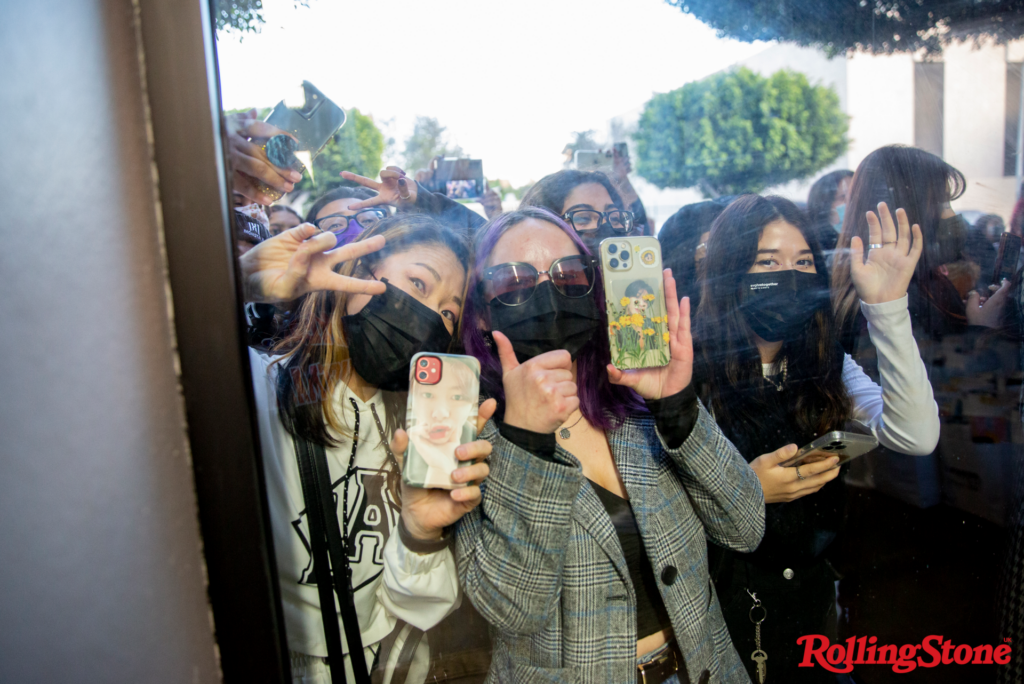
Monsta X’s fans in Los Angeles proved particularly passionate (Picture: Jesse DeFlorio) 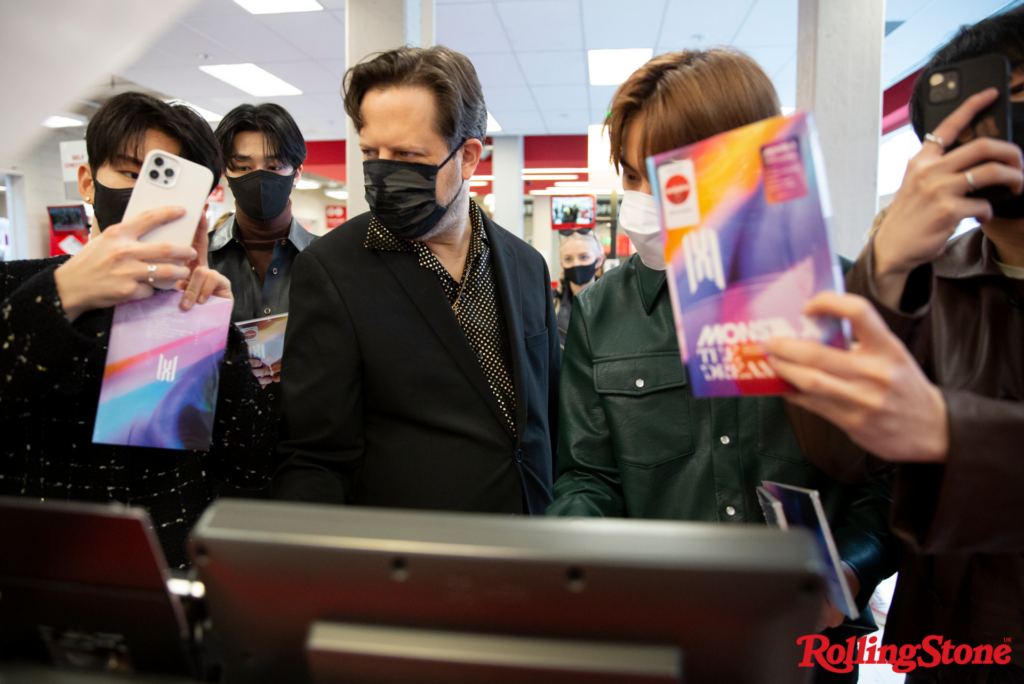
Monsta X visit a Target in LA (Picture: Jesse DeFlorio) 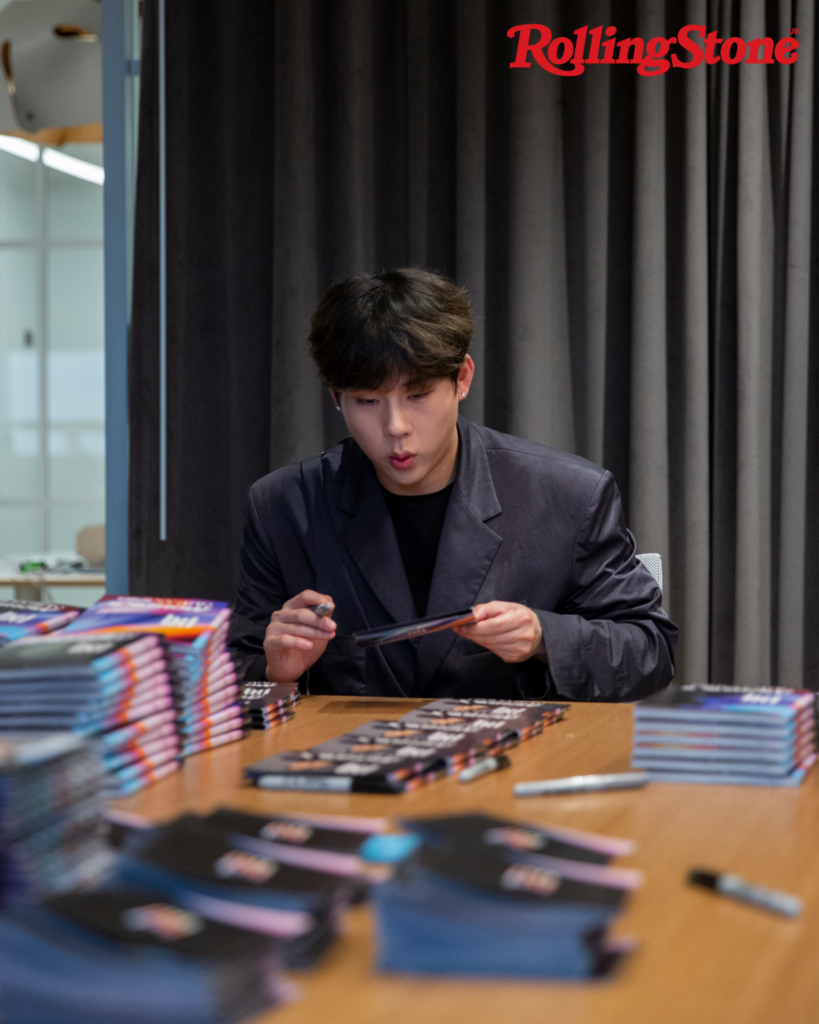
Monsta X signs records for their fans ahead of an anticipated signing (Picture: Jesse DeFlorio) 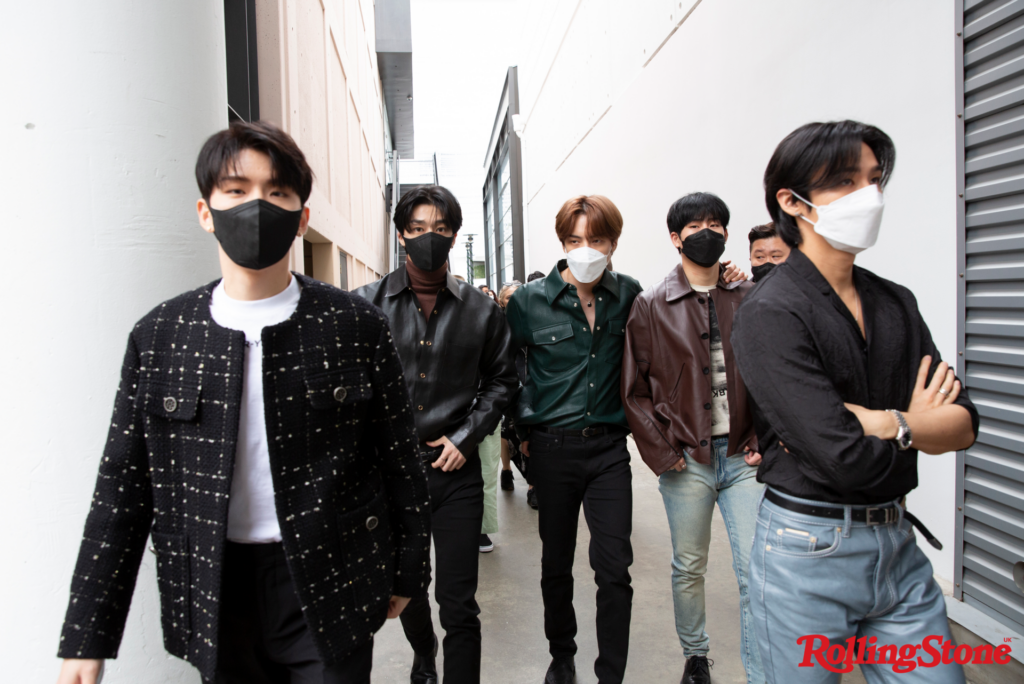
Monsta X in Los Angeles (Picture: Jesse DeFlorio) 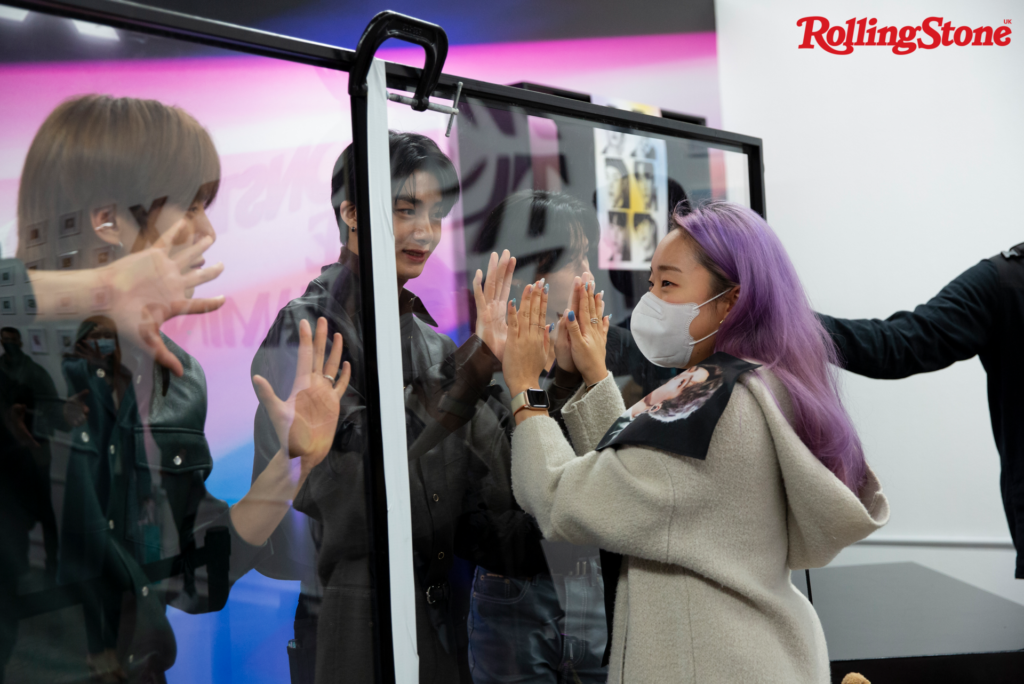
Monsta X meet their fans in Los Angeles (Picture: Jesse DeFlorio)
Their team consists of a glam crew of hair and makeup artists, a US and UK PR, a coterie of label workers from BMG, as well as photographers and content creators. At the centre of their solar system, burning brighter than the band, is one man: their idiosyncratic and geographically ambiguous manager, Eshy Gazit, who appears dripping in at least three big-name high-fashion brands at any one time and seems keen to present himself as the Scooter Braun of K-pop. He can’t, however, provide me with quotes about Monsta X because they have to be considered in depth; “The fans” he says, by way of explanation. Those with even limited knowledge of K-pop will be familiar with the stereotype of its stans being combative, enthusiastic and extremely active online. Gazit does appear as a talking head in the group’s new documentary, Monsta X: The Dreaming, to explain their success and importance in glowing and generalist terms.

What’s presented in the documentary is true in real life: the members of Monsta X are genuinely best friends, or as they prefer to refer to themselves, brothers. Behind the scenes, they joke with and embrace each other, walk with their arms around each other’s shoulders and provide vocal support when another wavers. With his typical deadpan humour, I.M. reveals that this brotherly love began when they started showering together. “When we were first debuting, there were only two bathrooms, so if you had to have a shower you can wait for your turn but it takes too long. To save time, we share the shower booths.” They’ve lived in a shared house since debuting as a group and will do so until Monsta X disbands, which is typical within the K-pop industry.
The relationship they have with each other, however, is atypical. The group are aware of other K-pop groups who don’t get along. According to Kihyun, the Monsta X method of communicating through disagreements – with volatility when required – is peculiar to them. “It helps that we only had brothers, not female siblings, so we can be direct,” he says. “If you’re not close, it’s obvious with a group when they’re performing on stage.” Their chemistry speaks to the fact that every decision from choreography specifics to when they’re going to eat lunch that day is governed by a majority vote.
The average music listener might not know the name Monsta X, recognising only K-pop’s biggest artist, BTS (three letters with at least as much global household clout in 2022 as Billie Eilish or Miley Cyrus). Monsta X are another of South Korea’s biggest exports but their output is sonically edgier with lyrical high-stakes drama. They flirt with the naughty romance of 90s boybands and lean hard into riffs and rap – the latter is led by Joohoney, the member who in the mid-2010s helped dispel snobbery around idol rappers in their home country. With their oldest member Shownu currently enlisted in mandatory military service back home, this press trip is about proving that the energy that Monsta X feel is intrinsic to the six-piece can still be created with only five members.

The first day is a look inside the content machine to see how the meat is made. The ingredients seem to be good lighting, man-power and a colourful media background. Even with all involved watching the clock, a filmed interview runs over its allocated slot, meaning a “Twitter spaces” chat is nine minutes behind schedule. The fans are on Twitter asking everyone here how it feels to be an incompetent US press team. Mikaela, who works in digital marketing at BMG, surveys this feedback breezily and continues planning TikTok material. “I think I’ll have them doing this today or tomorrow, that’d be cute,” she tells an older woman with a clipboard, who surveys Mikaela’s screen and nods approvingly.
According to Mikaela, promotional content for Monsta X is definitively made with the fans in mind. A Monsta X fan is officially called a Monbebe, somewhat romantically after the French term for ‘my baby’. “They are always paying attention,” she says. “There is a real sense of pride when we’re able to please the fans and get them excited because you know they are always honest and have the band’s best interest in mind.”

Fans are inarguably pleased once the content made over the three days is finally served. Monsta X have impeccable comic timing; I.M. and Joohoney are particularly wry and knowing. It’s December so their dream collaboration would, of course, be with Santa. A list of the animals they’d like to star in a music video with includes: lions, elephants, alligators and (Joohoney adds with a smirk towards us) “dinosaurs”. Interviewers tend to pose general questions rather than specifics, the type kids used to ask on British kids’ TV between the artist performing and getting covered in gunge. Monsta X have the patience of monks. They engage with every trite interaction as though it is original and spin each banal request into something for their own genuine amusement.
“Dumb question maybe–,” a radio host says, only for I.M. to interrupt encouragingly: “We love dumb questions.” Later in the conversation, I.M., the member with the most accomplished English and the group’s de facto lead speaker, rouses as if from a trance. He remembers the host asking him the same question three years prior: “Didn’t you ask this before?”
“Liners” are desirable when recording anything for radio. Once Gazit has determined that the group has liners to read (“We’re Monsta X and you’re listening to…”), they all huddle around a woman who holds sheets with all of them printed out in English. Liners maximise content, existing to run before different Monsta X releases or various hosted programmes or mass holidays. The band deliver near-identical introductory lines into a mic for half an hour standing up, summoning as much enthusiasm for the final line as the very first.


On another day, Monsta X emerge from a blacked-out van intended for celebrity charter hire with a glam squad of four pristine ladies. Gazit whirls in among them as the women dip backwards and he and Monsta X stride towards a shopping complex. This is a classic promo set-up: group enters American store (in this instance Target), buys their own CDs and the kitsch moment is captured for fans. Gazit somehow leads them from the middle of the group to where their CDs are kept. They point at and comment on Adele’s 30; they pick up some weights nearby and do some reps; they hold up baby-gros against each other’s chests. Within ten minutes, they buy their CDs – confused onlookers unsure of who this sprawling group of people is – and leave the store.
Outside, a middle-aged woman calls after the men: “Bye-bye, guys, Merry Christmas!” Half the group turn around at the very top of the escalator and return her message. Disappointingly, she thought she’d pressed the red button on her phone screen. She hadn’t and Monsta X have already disappeared, now 15 metres below, on the walk back to their van. “Oh, no!” she cries out and turns to me, tears in her eyes.
It is the night of The Dreaming album launch party. I.M. and Joohoney take a cocktail each from the bar and almost down them before they are whisked from the bustling room out into the warm city air. I manage to catch Joohoney’s attention before he walks out the door and ask why they are leaving. He shrugs and says he doesn’t know.

At our interview the following day, Joohoney explains more, “We really wanted to stay but we had a long day the next day and we had to have an early night, so we wanted to be professional.” All five members perch on sofas that have been pushed together in a corporate but pleasant room at the label. “If it was up to us we would’ve gotten drunk and had the time of our lives.” He shoots a grin across the room. “Slept there.”
“I don’t know if all celebrities are like us but our schedule is literally non-stop”
I.M. adds, “If we really started to drink, you wouldn’t handle us!” and they all laugh. K-pop artists, they say, don’t especially drink and party. Their version of partying is having a fun time at their concerts performing and engaging with their fans.
Their career is not for the easily fatigued or rattled. Monsta X explain that their parents are proud of what they do but are naturally concerned. “I think every parent worries about their children if they really care about them, but with our parents, we have to face the public,” says I.M. “I don’t know if all celebrities are like us but our schedule is literally non-stop, seriously. So, they might be considering our health and strength.”

I.M poses for Rolling Stone UK (Picture: Jesse DeFlorio)

Kihyun adds, “For K-pop idols, mental health is a huge concern too, so that’s also an area that our parents are concerned about.”
Minhyuk isn’t sure about the reality of K-pop training now, but their experience was gruelling. “When we were training, that system was very different, it wasn’t set up [properly] so it wasn’t that great of an environment,” he says. “There’s been a huge improvement since – companies have officially set up and are concerned about all-round things, including mental health.” The average K-pop trainee begins young, ideally in middle school. When Monsta X trained, they’d either leave school at lunchtime or the end of the school day, travel to the company training them and practise until 10 or 11pm. They’d take the last bus home and sleep for around five hours before waking up and going back to school to repeat the process. “Whoever wants to stay longer to practise, they can,” says Joohoney. “Some people would stay all night and go straight back into school.”
“There’s been a huge improvement since – companies have officially set up and are concerned about all-round things, including mental health”
I.M. struggled with his formative experience. “When I was training, I was walking a dark tunnel and you don’t know when that is going to end,” he says. “You don’t know how you’re going to make the debut or how you’re gonna be on stage. I don’t even know [if] I’m gonna get kept by the company [or not] so you get so anxious and there’s lots of pressure. So, I preferred when I had debuted.” After debuting and becoming part of an active, working K-pop band, your mindset must shift holistically. According to Monsta X, you’re no longer working individually to be the greatest performer, you must collaborate to achieve success for the whole team.


Appearance is another important consideration. The K-pop aesthetic is clean and sheer, one of purity and boyish charm. It reflects the tight dance routines and perfect vocal performances expected of idol groups. For Monsta X the pressure is not to be good-looking, but rather to take care of themselves, since ageing prematurely is an occupational hazard with the amount of work, stress and travel that comes with being a K-pop star.
I.M. confesses that he initially found it difficult to adjust to being perceived as an object.“When we just debuted, I was awkward seeing my face in pictures because there were lots of interviews and taking my photos and they’d script it and put it on the internet. That was so strange, I felt so strange. I didn’t like my own face,” he remembers. “But through that time, I was like, ‘OK, that’s me, that’s part of me too.’ I started to become comfortable. I am comfortable. I have seen myself for a few years.” It was the response from fans that helped him calibrate. “Sometimes I might see some ugly pictures and be sad or be like ‘oh shit’ but that’s OK because fans will see them. They even like our ugly faces, too. It doesn’t matter.”

Everything, the rhetoric goes, is for the fans. In Monsta X: The Dreaming Minhyuk mentions that their fans are like mothers. The choice of wording is unusual: artists commonly use “friends” or “family”. Why mothers? Minhyuk takes a moment to consider this and replies, “The fans always give so much. So, I started looking around to see who else is that giving and supporting. There are different ways to express love but the most diverse and the most encompassing is a mother’s love. If you think about it, at the core of it with fans, it’s a financial interaction – fans are purchasing our music and consuming it. But in addition to that, there’s so much more that they give than that simple back-and-forth interaction.” Meet-and-greets, then, are a chance for mothers and sons to reunite.
Monsta X arrive to the rapturous screams of American girls and women. Only 100 Monbebe won the chance to engage personally with their favourite K-pop band, but hundreds more line the street to catch a glimpse of them.
“The fans always give so much”
After waving to fans, Monsta X file inside the building and stand behind a crew of people who are busy erecting plastic walls. Each of the members fidget and play-fight with each other, except for I.M.. He stands up against the wall, lightly banging on it like a moody captive. Once the structure is secured, the girls are ready to be let in. Ordinarily at Monsta X hi-touch events – the term for occasions when fans are allowed to high-five their favourite artists – fans are allowed contact. Since the pandemic is still ongoing, they’re only allowed to touch through the plastic.

Amazingly, none of the fans voices any disappointment over this. As each set of ten is allowed through the doors, the women jump and cry or shuffle though bashfully. Each fan reaches their hand up to the plastic and Monsta X do the same. It’s a speedy process – no one can give gifts or take photos – but it’s been years since they could attend in-person Monsta X events so the opportunity is received gratefully. “If Covid wasn’t a thing, I’d be holding hands with them as long as I could,” says 30-year-old Carolina from California after her meet with them. “We couldn’t get photos because we didn’t have long enough but we have the memories… I hope I don’t get Alzheimer’s.” Eye contact with Monsta X was the biggest thrill for many. “I could see it in their eyes, their love for us. I know they’ve waited so long to see Monbebe so it means so much for us and I’m pretty sure for them as well,” says 29-year-old Libby from Orange County.
For these fans the release of The Dreaming is an important moment because, though they love all their music in all languages, this is another potential entry point for new English-speaking fans. There’s a certain thrill to hearing them sing in English too. Priscilla, a 37-year-old fan from California, describes a meme in the fandom that boils down to: Monsta X Japanese albums say, ‘Hey, I think you’re cute’, Korean albums say, ‘Hey, I wanna date’ and English albums say ‘Hey, I wanna hook up.’ “I like the English albums,” Priscilla says flatly. “It’s more fun as a fan to hear them be adult men as opposed to the normal K-pop that skirts around it.”
What is “the dreaming”: we hear the question and response again and again over the three days. Monsta X are delighted to explain that it’s a reference to how they’ve been dreaming of seeing their fans again. A question they do not like to hear is “What are your goals?” It’s often asked of K-pop groups, both domestically and internationally, but is only relevant to Monsta X when they ask it of themselves. The group describe the bittersweet moment their absent member Shownu departed for military service. After Minhyuk shaved Shownu’s head, he left their house and saluted them for the last time from the opposite side of the street. “Being a man in Korea is a duty,” I.M. says, as they all chime in that they know the fate is imminent for each of them as they’re reaching the age range of service. “Life is quite difficult and specifically Korean men’s duty is to do military service for two years, so you have to organise ‘What are we gonna do before we go? We have to work out: ‘What do I have to do before I go? What do I need to accomplish?’”
After the interview concludes and one of the dictaphones is switched off, Monsta X disperse to drink their iced coffee and prepare for some quick photographs for us. First the ever-thoughtful and serious I.M. has a question of his own. “I think your job is very interesting because you’ve been following us around for two, three days,” he says, tentatively. “It’s kind of like exploring somebody’s undiscovered world. That’s your job – what’s it like? You learn about us, how we do everything.” It is interesting to observe what’s going on for an individual or a group, beyond the stories you’re being told from different directions, I say. You can get a feel for their energy, how they’re moving through their world at that given time and why that might be. The others move off to line against the wall for photographs.
“I’m just quite curious about your life and how you’re feeling about this,” I.M. says. There’s no time for a considered answer: “Your turn now,” Joohoney says. The photographer is preparing for the next shot. “Do you want a sad face or a smiley face?” I.M asks, presumably of the photographer but seemingly to everyone in the over-crowded room.
